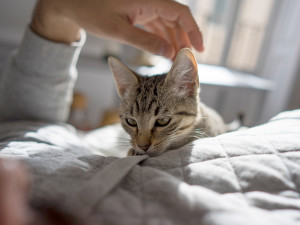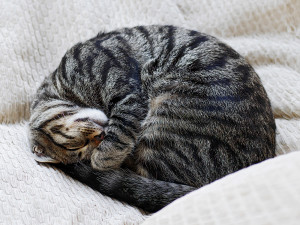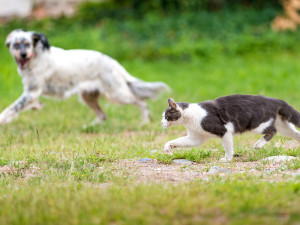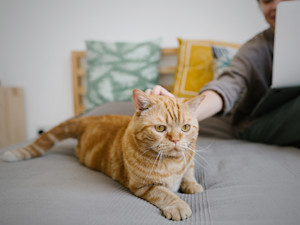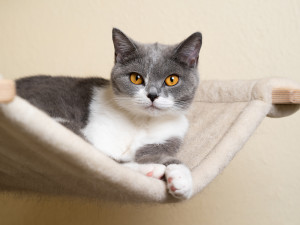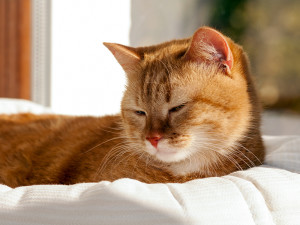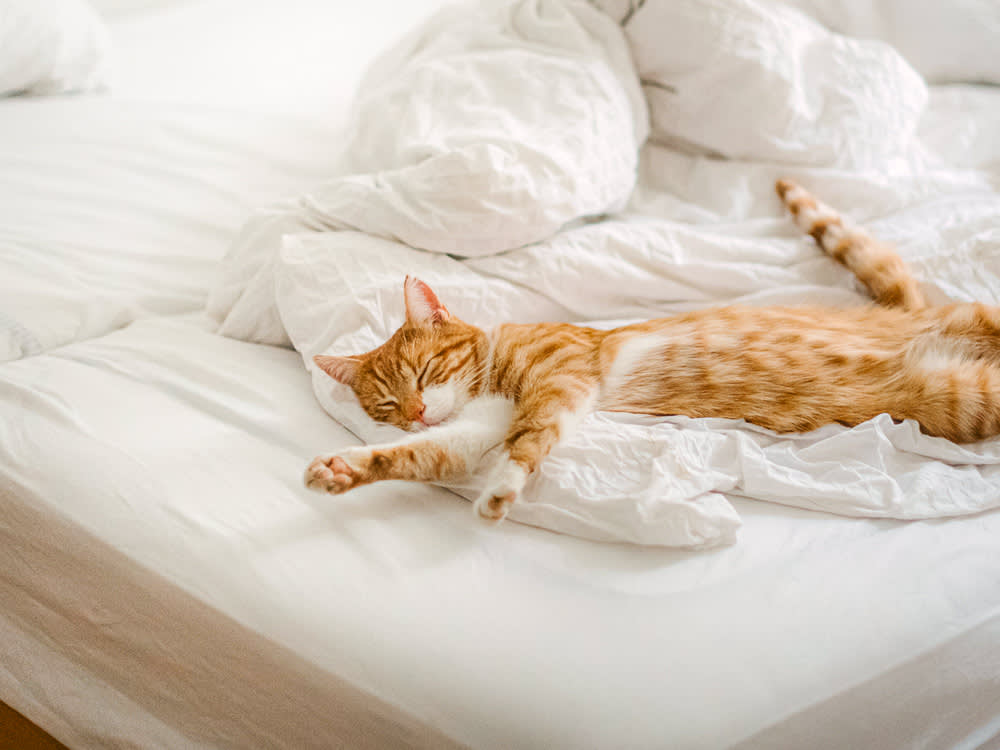
Share Article
In This Article:
Cat Sleep Habits What Causes Twitching During Sleep? Normal Twitching vs. Abnormal Twitching When to Seek Veterinary Advice Is Twitching Age-Related?
Does your cat move so much in their sleep that it feels like rush hour in your bed? Cats twitch in their sleep for a variety of reasons, including dreaming and/or certain medical conditions. If you notice your cat twitching in their sleep, it’s important to observe them closely to see if there are any signs of distress.
While almost all cats will have the occasional twitch, jerk, ear flick, and/or tail swish during normal sleep, cats can have more concerning signs as well — although that’s rare. Read on to learn which signs are normal and which ones could indicate a problem.
Main takeaways
Occasional twitching is a normal part of sleep for most cats.
Signs of a problem include severe shaking, twitching that continues when they are awake, or other changes in their health and behavior.
Consult your vet if you are concerned about twitching or other changes with your cat.
Cats’ sleep habits
Every cat parent knows that cats are great sleepers, though their cats don’t always choose to doze at the most convenient times or in the most out-of-the-way places. Naturally crepuscular, cats tend to be most active in the evening and early morning hours. This is why many cats think that 4 a.m. is the optimal time for feeding and roughhousing.

This also means that large chunks of the day are spent lounging and/or sleeping. Indoor cats typically sleep 10 to 13 hours per day, though this can vary based on age and activity level, with some cats sleeping up to 20 hours a day. A cat’s sleep cycle lasts about 104 minutes, which includes 25 to 35 minutes of wakefulness, followed by about 75 minutes of sleep. (A cat’s sleep cycle is shorter than the typical human sleep cycle of 90 to 120 minutes.)
These cycles may repeat multiple times during a longer snooze. While at other times, they may not complete a full sleep cycle.
Stages of cat sleep
Like humans and many other animals, cats cycle through different stages of sleep during each sleep cycle. In simple terms, this can be broken down into wakefulness, REM, and non-REM sleep.
REM sleep is classified as a deeper stage of sleep where a cat’s body tends to be completely still and muscles are not active. This stage is also characterized by rapid eye movement, or the movement of eyes under the eyelids, which is where the acronym comes from. A cat’s sleep periods alternate between two to 10 minutes of REM sleep, and 12 to 15 minutes of non-REM sleep.
Non-REM sleep encompasses the other parts of the sleep cycle when a cat is in a lighter phase of sleep. This includes the initial drowsy period when they first fall asleep and can be easily woken up, followed by deeper and deeper phases of sleep as their breathing slows and muscles begin to relax, eventually transitioning to REM sleep.
Neurological mechanisms during sleep
While it may look like a sleeping cat is doing nothing at all, there are many changes taking place in their body and mind during sleep.
Muscle relaxation and movement: In general, as cats move into deeper stages of sleep, there is more muscle relaxation and less movement. Once cats enter REM sleep, there is a tonic phase of REM sleep, where muscle atonia occurs. This is a kind of short-term paralysis of most muscles in the body, leading cats to be very still and preventing behaviors like sleepwalking. There is another phase of REM sleep, known as the phasic phase, where muscle twitching can occur.
Brain activity: During REM sleep, the brain is very active, similar to the brain of a cat who’s awake. This is the phase when dreaming occurs and has also been associated with important roles in learning and memory. However, during non-REM sleep, brain activity tends to be slower than in an awake animal.
What causes twitching during sleep?
There are many possible causes of twitching during sleep. Here are some of the common ones.
Dreaming during REM sleep
As with people, when cats enter REM sleep, their body is relaxed, but their brains are actively processing the day’s events. We assume cats dream during REM sleep because they show brain activity patterns similar to those of humans while sleeping. And we do know that the phasic phase of REM sleep is a common stage for muscle twitching and could explain why cats twitch during deep sleep. The good news is that little twitches of the face, legs, ears, and tail are not causes for concern and should be considered part of a cat’s normal sleep quirks.
Having an itch
Cats who are very itchy may have trouble settling down to sleep and/or reaching deeper levels of sleep. You may notice that they doze off, only to pop up and lick or bite at their skin. Sometimes their fur may also seem to twitch when they are itchy, thanks to very well-developed muscles under the skin. Some of the most common reasons for a cat to be very itchy include fleas, ear mites, or allergies. Be sure to see your vet if you are noticing that your cat is uncomfortably itchy.
Seizures
On a slightly scarier note, seizures can also include signs such as twitching, shaking, spasms, and tremors. In addition to twitching, seizures may also cause a cat’s limbs to go rigid. And they might fall over, and/or lose control of their bowels or bladder. Cats also behave abnormally right before and right after a seizure: They may be wobbly on their feet, vocalize, and/or have other neurologic signs. Cats who have seizure disorders will have seizures when they are awake as well, so if you are only noticing twitching in your sleeping cat, it is likely not a seizure. If you suspect your cat is having seizures, see a vet right away. It is very important to get seizures under control to prevent long-term brain damage.
Muscle spasms and/or tremors
Muscle spasms can look a lot like normal twitching in a sleeping cat. True muscle spasms may be more forceful than the gentle kicks and twitches associated with normal sleep, and they will persist even after a cat wakes up. Muscle spasms or tremors can occur due to certain toxins such as those in flea products containing permethrin (that are intended for dogs), neurological issues, low calcium, congenital problems, or pain. If you find it difficult to differentiate these from normal sleep activity, take a video to show your vet.
Parasomnias
Parasomnias are types of sleep disordersopens in new tab that involve abnormal movements, behaviors, or vocalizations while asleep. These are not common or well-understood in cats. They can occur secondary to genetic disorders, brain tumors, or metabolic diseases.
Injury to a specific part of the brain called the pontine tegmentumopens in new tab can also cause a cat to sleepwalk, but this is extremely rare. Some of the movements seen with sleep disorders can look like seizures. But unlike the jerking seen during a seizure, these movements will stop as soon as the cat is woken up. If your cat is active for extended periods while they seem to be sleeping, experiencing more intense activity than some small twitches, and/or growling or hissing while sleeping — take videos and contact your veterinarian. Most sleep disorders are diagnosed based on recorded or described symptoms and an appropriate response to waking during events (ruling out a seizure). A veterinary neurologist would be needed to find brain lesions creating sleep disorders.
A developing nervous system
It’s been theorized that a rapidly developing nervous system could make a kitten twitch more than an adult cat while sleeping. It’s even more difficult to do sleep studies on kittens than on older cats, so precise information on this subject is quite limited. In many species, young animals spend more of their sleep cycle in REM sleep and as they age, the periods of REM sleep become shorter. The same is likely true for kittens, which could explain why kittens may twitch more than adult cats in their sleep.
What is normal twitching vs. abnormal twitching
Reasons to be concerned about your cat’s twitching include when the twitching seems frequent, intense, and/or is accompanied by other changes in their health or behavior. If your cat does the occasional twitch in their sleep, but wakes up acting just fine and has no other changes in their health, this is most likely a normal part of their sleep cycle and nothing to worry about.
But if you notice that your cat is twitching frequently, especially if it occurs both during sleep and when they are awake, it is important to see a vet because this is abnormal. Additionally, if you notice other changes in your cat, such as a wobbly walk, changes in appetite or behavior, or any other signs of illness, these are signs that something more serious is going on, and it is important to investigate further.
When is it necessary to seek veterinary advice?
It’s always OK to seek veterinary advice if you are concerned about your cat. Catching a problem early on, before it becomes more serious, can be a huge win for both your cat and your wallet.
It can be especially helpful to your vet if you share a video of the signs you are noticing, so they can see for themselves what’s happening. Be sure to contact your vet if your cat’s twitching is becoming more frequent or severe, and/or if you notice any other signs that concern you about their health or behavior. Signs consistent with seizures or constant twitching in a cat who’s awake are considered medical emergencies and require immediate attention.
Is twitching related to age?
Occasional twitching during sleep can be normal in cats of any age. Anecdotally, people have noted that kittens tend to be more active when they’re sleeping. Younger animals tend to spend more of their sleep in REM cycles, so it makes sense that they may have more activity in their sleep. As long as they seem fine when woken up, and the movements are not getting more severe, it is likely a normal part of sweet little kitten dreams.
Bottom line
Most cats will twitch in their sleep from time to time, and this is nothing to be concerned about.
There are serious conditions associated with tremors and twitching in cats who are awake. If you notice these signs after your cat wakes up, be sure to see a vet.
Taking a video of the signs you observe can be a very helpful tool for your vet to make an accurate diagnosis.
FAQs
What is feline hyperesthesia syndrome?
Feline hyperesthesia syndrome, or FHS, is a neurologic condition in which cats experience discomfort and pain without a clear underlying cause. They are hypersensitive to touch. Other common signs include frequent twitching or rippling of the skin over their lower back, over-grooming, and self-traumatizing (or biting) their skin, tail, or paws to the point of injury.
Should I wake my cat while twitching?
Twitching can be normal during deep sleep and doesn’t need to be stopped. If the twitch is intense or frequent, you can wake them up to make sure it stops and that they are otherwise OK. Don’t make a habit of disrupting their deep sleep though, or they’ll get pretty grumpy.
How can I ensure my cat’s sleep is comfortable?
The best way to make sure your cat sleeps well is to provide a quiet, cozy area where they can feel safe and protected. Cats don’t love sleeping near loud noises, in exposed areas, or around unfamiliar animals or people. Be sure they have a place they can sneak off to when they don’t want to be disturbed, such as a high perch or room that is away from the busiest part of the home.
Is it normal for cats to twitch?
It can be normal for cats to mildly twitch their whiskers, ears, tails, or limbs while they’re sleeping. These movements should be infrequent and relatively brief. Cats may also occasionally twitch their tails, whiskers, and fur along their backs when they are awake if they are excited, playing, or itchy. The main emphasis is that these should be infrequent, short, episodes that are not accompanied by any other physical or behavioral changes. If you feel that these episodes are frequent, severe, or are associated with other health concerns, be sure to see a vet right away.
References
Blumberg, Mark S., et al. “What Is REM Sleep?” Current Biology, vol. 30, no. 1, 6 Jan. 2020, pp. R38–R49, www.cell.com/current-biology/pdf/S0960-9822(19)31515-5.pdfopens in new tab, https://doi.org/10.1016/j.cub.2019.11.045opens in new tab.
Campbell, Scott S., and Irene Tobler. “Animal Sleep: A Review of Sleep Duration across Phylogeny.” Neuroscience & Biobehavioral Reviews, vol. 8, no. 3, Sept. 1984, pp. 269–300, https://doi.org/10.1016/0149-7634(84)90054-xopens in new tab.
Hendricks, Joan C., et al. “Different Behaviors during Paradoxical Sleep without Atonia Depend on Pontine Lesion Site.” Brain Research, vol. 239, no. 1, May 1982, pp. 81–105, https://doi.org/10.1016/0006-8993(82)90835-6opens in new tab.
Hendricks, J C, et al. “Movement Disorders during Sleep in Cats and Dogs.” Journal of the American Veterinary Medical Association, vol. 194, no. 5, Jan. 1989, pp. 686–9, pubmed.ncbi.nlm.nih.gov/2925485opens in new tab.
Lai, Y, et al. “Muscle Atonia in REM Sleepopens in new tab.” Rapid Eye Movement Sleep, 1999. semel.ucla.edu/sites/default/files/sleep/publications/Narosa70.pdfopens in new tab.
Lucas, E.A, and M B Sterman. “The Polycyclic Sleep-Wake Cycle in the Cat: Effects Produced by Sensorimotor Rhythm Conditioning.” Experimental Neurology, vol. 42, no. 2, 1 Feb. 1974, pp. 347–368, https://doi.org/10.1016/0014-4886(74)90032-6opens in new tab. Accessed 6 Oct. 2023.
Toth, Linda A, and Pavan Bhargava. “Animal Models of Sleep Disorders.” Comparative Medicine, vol. 63, no. 2, Apr. 2013, p. 91, pmc.ncbi.nlm.nih.gov/articles/PMC3625050opens in new tab.

Dr. Amy Fox, DVM
Amy Fox, DVM is a small animal veterinarian in New York City with over thirteen years of experience in a mixture of general practice, emergency medicine, and shelter medicine. A lifelong animal lover, Dr. Fox studied biology in college and then worked as a veterinary nurse before pursuing veterinary school at Cornell University. Her expertise includes surgery, dentistry, and management of chronic conditions, and she is interested in toxicology, pain management, nutrition, care of senior pets, and educational outreach. Dr. Fox also enjoys writing about veterinary medicine and teaching, and her work has previously appeared in Spruce Pets. In her free time, she loves to cook, garden, go for long runs, and hang out with her goofy mixed-breed dog May, who provides never ending comic relief!

Dr. Bartley Harrison, DVM
Dr. Bartley Harrison is a veterinarian with more than 19 years of experience. He has treated a variety of species in emergency and speciality practices for both large and small animals. His primary interests as a vet are emergency medicine and critical care.

Kate Sheofsky
Kate Sheofsky hails from San Francisco, where she developed a love of writing, Giants baseball, and houses she can’t afford. She currently lives in Portland, OR, and works as a freelance writer and content strategist. When not typing away on her laptop, she enjoys tooling around the city with her two rescue pups searching for tasty food and sunny patios.
Related articles
![Blue white British shorthair cat resting on a hammock]()
7 Cat Hammocks That Make the Perfect Lounge Accessory for Your Kitty
Hang loose, little dudes.
![Red cat with squinted eyes laying in a basket closeup]()
6 Ways Your Cat Could Tell You They Are in Pain
Here are all the way your kitty is trying to tell you they’re hurting.
![MoMA’s pets pop up at the MoMA Design Store]()
MoMA Has the Pop-Up Store of Your Artsy Pet Parent Dreams
A watermelon-shaped litter box, crocheted toys, and harnesses and leashes that come in colors your favorite TikTok influencer would envy.
![A senior cat is held in their owner's lap]()
How to Care for Your Senior Cat
From taking them to the vet more often to giving them a hand with grooming, older kitties need a little extra TLC.
![Man sitting with cats, surrounded by flowers]()
Lounge
Here are the beds, dog crates, cat towers, and everything else your pet needs to curl up and catch a snooze. Or stare at you from their cozy perch while you fulfill their every need.

